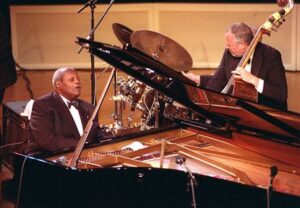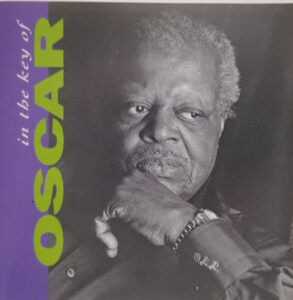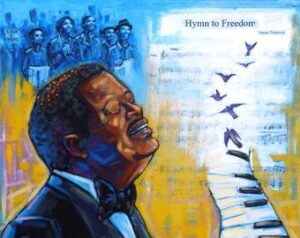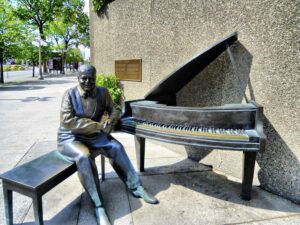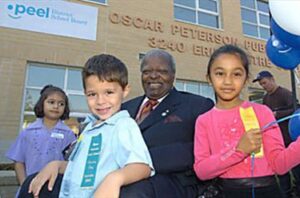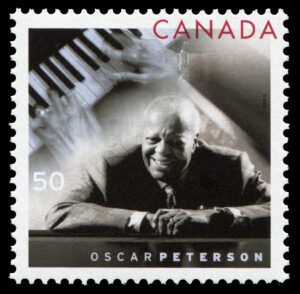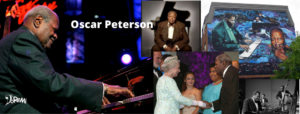
Oscar Peterson (1925-2007) was truly one of the greatest jazz pianists of all time, and the first jazz star that Canada could truly call its own! In 2021, Historica Canada featured Peterson in a new Heritage Minute.
Oscar Peterson was called the “Maharaja of the keyboard” by Duke Ellington, and “the man with four hands” by Louis Armstrong. His career lasted more than 60 years, taking him from his home town of Montreal to Carnegie Hall, and around the world.
Recording Career
A prolific recording artist, he typically released several albums a year. He made his first recordings for RCA Victor in March 1945. These early releases, notably “I Got Rhythm” and “The Sheik of Araby,” reveal the talent for boogie-woogie that earned him the nickname “the brown bomber of boogie-woogie.” They also reveal the extraordinary technique that would characterize his playing throughout his career. He was renowned for his remarkable speed and dexterity, meticulous and ornate technique, and dazzling, swinging style. He released over 200 recordings, won a Juno Award, seven Grammy Awards, a Grammy Lifetime Achievement Award, and an International Jazz Hall of Fame Award.
Compositions
Peterson also gained world-wide recognition as a composer. While following a touring schedule that kept him on the road for over 300 days a year, he worked to devote as much time as possible to writing music. Some of his most noted works are his 1964 Canadian Suite and his 3-part suite entitled A Salute to Bach. He also composed for numerous film projects, notably the 1978 film The Silent Partner starring Elliott Gould and Christopher Plummer. In 1978 as well, he wrote the score for the National Film Board of Canada’s production Fields of Endless Day, which tells the story of U.S. slaves using the Underground Railroad to escape to Canada. His score for the biographical documentary In the Key of Oscar received a Gemini Award in 1993.
Educator
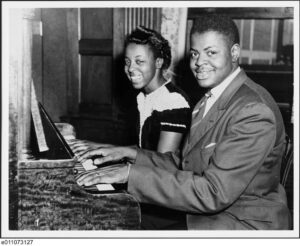 In the Peterson family, older siblings were expected to teach music to their younger sisters and brothers. Oscar’s first teacher was his older sister Daisy. She went on to become a noted piano teacher in Montreal. Music education became important to Oscar, and ensuring that younger generations of artists always had mentors and educators, was a significant part of his career. In 1960, he helped to found the Advanced School of Contemporary Music (ASCM) in Toronto. Unfortunately, his touring schedule didn’t allow him much time for the school, which eventually closed. He did, however, make sure that he incorporated as many master classes as possible into his schedule while on the road.
In the Peterson family, older siblings were expected to teach music to their younger sisters and brothers. Oscar’s first teacher was his older sister Daisy. She went on to become a noted piano teacher in Montreal. Music education became important to Oscar, and ensuring that younger generations of artists always had mentors and educators, was a significant part of his career. In 1960, he helped to found the Advanced School of Contemporary Music (ASCM) in Toronto. Unfortunately, his touring schedule didn’t allow him much time for the school, which eventually closed. He did, however, make sure that he incorporated as many master classes as possible into his schedule while on the road.
Peterson mentored the York University jazz program and was the Chancellor of the university for several years in the early 1990s. He published jazz piano etudes for students to practice, and also asked them to study the music of J.S. Back, especially The Well-Tempered Clavier, the Goldberg Variations, and The Art of Fugue which he deemed essential for every serious pianist.
In 2010, York University’s Department of Music created a $40,000 Oscar Peterson Entrance Scholarship.
Humanitarian
Oscar Peterson was also a dedicated advocate for human rights. He realized that his success as a musician gave him a voice, and he took that responsibility very seriously. He often spoke of the racism he faced when travelling in certain parts of the U.S. during the peak of the Civil Rights Movement. He found it truly unacceptable to come home to Canada, a country which he loved and felt should set an example for the rest of the world, only to find many of the same issues. In 1962, Peterson composed Hymn to Freedom. The following year, Harriette Hamilton penned lyrics to the song, beautifully capturing the message of freedom that Peterson wanted his music to convey. In 2008 the composition was inducted into the Canadian Songwriters Hall of Fame, and in 2021, the Coalition for Music Education chose Peterson’s Hymn to Freedom for its Music Monday anthem.
Honours and Awards
Throughout his career, Oscar Peterson made Canada his home base. In 1958 he moved from Montreal to Toronto, and then to Mississauga. He is Canada’s most honoured musician.
His efforts as a Humanitarian and his firm belief that every individual should be seen as equal were widely recognized in 1984 when he was appointed Companion to the Order of Canada, our nation’s highest civilian honour.
Peterson was the first recipient of the Governor General’s Performing Arts Award for Lifetime Achievement. Among his other notable recognitions are the Glenn Gould Prize, the BBC Radio Lifetime Achievement Award, Member to the Order of Ontario, Chevalier of the Order of Quebec, Ordre des Arts et des Lettres (France), Canadian Music Hall of Fame, JUNO Awards Hall of Fame, Canadian Songwriters Hall of Fame, UNESCO Music Prize, Praemium Imperiale World Art Award, and sixteen honourary doctorates.
In 2002, Peterson became the first person inducted into the Canadian Jazz and Blues Hall of Fame. He also received a lifetime achievement award that year from the Urban Music Association of Canada. In 2003, Mississauga named a street Oscar Peterson Boulevard, and in 2005 a nearby elementary school was named after him. In 2005 as well, Canada Post made him the first living person, other than a reigning monarch, to appear on a stamp. In 2010, Queen Elizabeth II and the Duke of Edinburgh unveiled a life-sized sculpture of Peterson which sits outside the National Arts Centre in Ottawa, and 2013, he was inducted into Canada’s Walk of Fame.

